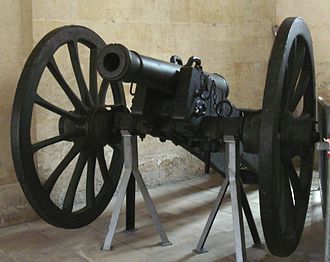The Year XI system (French:"Système An XI", after of the 11th year of the French Republic, i.e. 1803) was a French artillery system developed during the rule of Napoleon. The Year XI system was original in that it brought various improvements to the highly successful Gribeauval system, on which many successes of the Napoleonic Wars relied. It especially consisted in streamlining the existing Gribeauval designs.[1] The main proponent of the new system was General Marmont.[2] It was superseded by the Valée system.


Definition
editIn light of the French Revolutionary Wars it appeared especially that the Gribeauval 4-pdr was too light, and that the 8-pdr was too heavy for medium field artillery.[3] These two guns had not appeared adequate against enemy 6-pdr guns.[4]
In order to define the new improved system, Napoleon formed a committee of Artillery on 29 December 1801, presided by general Augustin Gabriel d'Aboville, First Inspector of Artillery. The committee accomplished its research from 11 January 1802 to 21 July 1802.[5] Napoleon himself participated in the proceedings:
"The artillery should have but 4 calibres, the 6, 12, 24 prs. and the 5½-in. howitzer. In this way we abolish 4 calibres. We should add 3 prs. for mountain equipment. In abolishing the [1-pdr] Rostaing guns, we get rid of stubborn beasts not worth the trouble they give. 3 prs. should be a minimum caliber."
— Napoleon, on Gribeauval system.[6]
The committee gave its results on 2 May 1803.[7]
One of the main findings of the committee was as follows:
- To recommend the introduction of a 6-pdr and the suppression of the 4-pdr and the 8-pdr.
- The field artillery would thus be composed of a 12-pdr cannon, a 6-pdr cannon and a 24-pdr (5.72-inch) howitzer.
- The mountain artillery would have the short 3-pdr cannon, short 6-pdr cannon and 24-pdr howitzer.
- Siege artillery was also modified, with the introduction of new Long 24-pdr and Short 24-pdr.
- Garrison artillery was also modified, with the introduction of new Long 24-pdr, Long 12-pdr and Long 6-pdr cannons.
- New Mortars as well as 324mm, 216mm and 152mm mortars, and 405mm perriers.[8]
Obsolescence
editThe Year XI system would be further improved with the Valée system in 1828.
See also
editMedia related to Year XI system at Wikimedia Commons
Notes
edit- ^ The Roots of Artillery Doctrine: Napoleonic Artillery tactics reconsidered by B McConachy - 2001 [1]
- ^ Chartrand (1) pp.23-34
- ^ Dawson et al (2007) p 70
- ^ Napoleon's Guns, 1792-1815 - René Chartrand p.21
- ^ Dawson et al (2007) p 70
- ^ Dawson et al (2007) p 73
- ^ Dawson et al (2007) p 74
- ^ Dawson et al (2007) p 74, 173 and 177-179
References
edit- Dawson, A.L., Dawson P.L. and Summerfield S. (2007) Napoleonic Artillery, Crowood Press, ISBN 978-1-86126-923-2
- Smith, Digby (trans) (2011) "The Austrian Cavalry Gun in Comparison to the Horse Artillery of Other States by Smola in 1827," Smoothbore Ordnance Journal, Issue 1, Ken Trotman Publishing, ISBN 978-1-907417-13-9